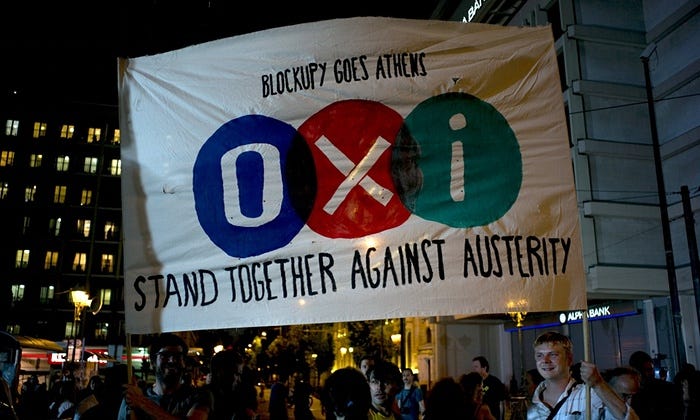
Greece have voted for the most part no to the democratic blackmail and meddling from the European union. Thankfully for fuck sake.
Over the last few days it has been obvious that the European Union and the Europgroup in particular only want 1 thing, that the greek government should fall.
They have warned all the time against the referendum and don’t you dare to actually disagree with our lines of thinking.
But in the last few days a few interesting articles were published:
The IMF (A third of the Troika)
First the IMF itself published a long article on the fact that they actually believe along the lines of the Greek government:
The fund published a draft of its latest analysis of Greece’s public debt yesterday, detailing a litany of factors that “render the debt dynamics unsustainable.” That’s a bureaucratic way of saying that there’s no chance that the country’s lenders will ever be repaid in full.
The IMF reckons that in addition to needing a new three-year bailout worth some €60 billion ($67 billion), Greece should have the maturities on its existing loans doubled, from 20 to 40 years. And that’s under relatively rosy economic assumptions — if things keep going like they’re going (down), the only way to give Greece a fighting chance at repaying its loans is to extend maturities as well as write off a significant chunk of its debt. A “haircut” worth a mere €53 billion ($59 billion) would do it, the IMF says.
The Germans (Basically the rulers of Europe)
And then came the point that even the Germans knew that they where pushing the wrong horse:
Greek crisis: NSA phone tap of Angela Merkel reveals she knew Greece’s debt was unsustainable — Vox: “Greece’s debt isn’t about money
Greece’s debts really are unsustainable. This is just basically not a debatable point. The reason it’s not genuinely shocking to hear that Merkel privately admitted this is that nobody really disputes it. Greece’s creditors know that they aren’t going to be paid back. But they want the debt to stay on the books anyway.
Why?
Well because as long as the debt is on the books, Greece needs to keep asking for permission to roll the debt over and failure to pay debts can be used as a political trigger for forcing Greece out of the Eurozone. The debt, in other words, isn’t about money. It’s about political control. If the debt is formally forgiven then not only do Greece’s creditors need to write down some money, but they need to let Greece go on its merry way. If the debt is merely subjected to repeated rounds of extend and pretend then Greece’s creditors get to keep making various demands about structural reform.”
And:
That’s what “everyone knows” about the situation, and it’s what “everyone” knew last week, last month, and last year. European Union bureaucrats will tell you, the Greek government is well-aware, and it’s all-in-all not exactly a big secret.
But this is kind of like how “everyone” knew that the link between Saddam Hussein and 9/11 was about altering US risk-tolerance rather than about direct operational ties. Nobody told the American voting public! In fact, they were told just the opposite to keep the whole project viable.
By the same token, the stories that are being told to the population not just of Greece but also of Finland, Germany, Austria, the Netherlands, etc. are not that Greece’s debt is a symbolic and legal token of political control whose purpose is to allow Greece to be governed by experts at the European Central Bank rather than elected officials in Athens. They are being told that Greece’s debt represents real monetary value that is owed to Northern Europe’s taxpayers, and that whether or not they get their money back is a huge point of contention.
One of the best stories I’ve read about the situation is the following:
Greece by interfluidity
A few parts of it:
Among creditors, a big catchphrase now is “moral hazard”. We cannot be too kind to Greece, we cannot forgive their debt with few string attached, because what kind of precedent would that set? If bad borrowers, other sovereigns, got the idea that they can overborrow without consequence, if Spanish and Portuguese populists perceive perhaps a better deal is on offer, they might demand that. They might continue to borrow and expect forgiveness, and where would it end except for the bankruptcy of the good Europeans who actually produce and save?
The nerve. The fucking nerve. Lenders, having been made nearly whole on their ill-conceived, profit-motivated punts, now fear that if anybody is nice to somebody who doesn’t deserve it, where will it end? I’d resort to that cliché about chutspa, the kid who murders his parents then seeks leniency ‘cuz he’s an orphan. But it’s really too cute for the occasion.
….
>I think the explanation is quite simple, though. Having recast a crisis caused by a combustible mix of regulatory failure and elite venality into a morality play about profligate Greeks who must be punished, Eurocrats are now engaged in what might be described as “loan-shark theater”. They are putting on a show for the electorates they inflamed in order to preserve their own prestige. The show must go on.
Throughout the crisis, European elites have faced a simple choice: Acknowledge and explain to electorates their own mistakes, which do not line up along national borders of virtue and vice, or revert to a much older playbook and manufacture scapegoats.
Such tiny, tiny people.
It’s about political power

These 3 snip bits alone makes it very clear that it’s not about economics and money. It’s about politics and the decisions the European government makes without consulting the people in the countries.
For them, the strangest idea of all this is that they know well how to handle the situation. Do they want to sound very strict or in the end do they really follow-up.
Because of all the noise they made last week that with a no vote Greece would leave the Euro zone, the question is now, will they put up or shut up?
Prepoll inquiries
Then the next question is, how did the prepoll inquiries fuck up so badly that they didn’t forecast this massive amount of victory for the No camp? This is the second high-profile case after the general elections from the UK that they really got it wrong.
What I do think is that they have a very wrong inquiry sample and foremost with little younger generation members.
What’s your opinion?
The most interesting pieces I’ve read the last week (Next to the ones mentioned in the article):
- Greece crisis could be a Sarajevo moment for the eurozone
- Varufakis: ‘Lo que hacen con Grecia tiene un nombre: terrorismo’
- 11 things about the Greek crisis you need to know
- This referendum is a fight between the Greeks and Europe’s cruel capitalism | Aditya Chakrabortty
- Alexis Tsipras must be stopped: the underlying message of Europe’s leaders
- Joseph Stiglitz: how I would vote in the Greek referendum
- How Eurocrats, Greeks, Germans, and Eastern Europeans View the Greek Crisis